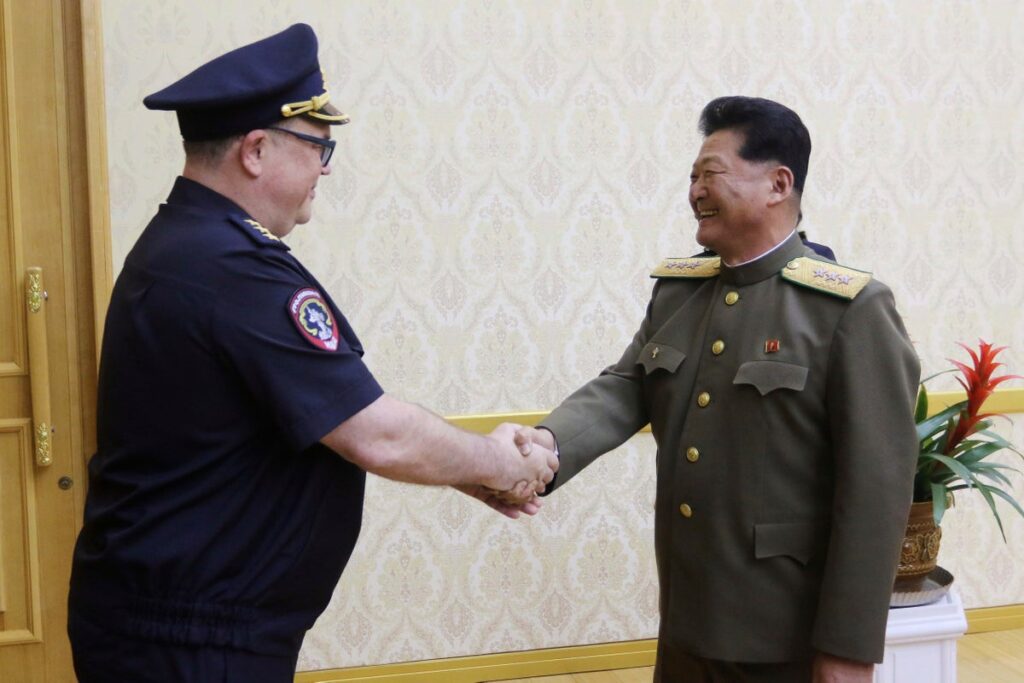U.S. and Allies Accuse Russia and North Korea of Violating UN Sanctions and Bolstering Military Ties
On Thursday, the United States along with ten allied nations publicly condemned the military collaboration between Russia and North Korea, asserting that it blatantly breaches United Nations sanctions. This illicit partnership has reportedly enabled Moscow to intensify its missile assaults targeting Ukrainian urban centers.
Historical Context and Recent Developments
This statement marks the first joint declaration since these nations united to challenge North Korea’s sanctions violations. The move follows Russia’s veto in March 2024 against a proposed resolution to extend the monitoring efforts of a UN Security Council panel dedicated to scrutinizing Pyongyang’s compliance. Since 2010, the UN has been documenting North Korea’s breaches of sanctions through periodic reports.
Evidence of Ongoing Illicit Activities
The 29-page report, compiled by the Multilateral Sanctions Monitoring Group-which includes the United States, Australia, Canada, France, Germany, Italy, Japan, the Netherlands, New Zealand, South Korea, and the United Kingdom-presents compelling evidence of coordinated illegal activities. These actions, the report claims, are in direct violation of UN resolutions designed to restrict North Korea’s military capabilities and economic activities.
Details of Military and Material Transfers
According to the report, North Korea has been clandestinely transferring weapons and related equipment to Russia via maritime, aerial, and rail routes. These shipments include artillery, ballistic missiles, and combat vehicles, all intended to support Russia’s ongoing conflict in Ukraine. The report highlights that Russia has supplied North Korea with advanced air defense systems, and North Korean troops have been deployed to bolster Russian military efforts, marking a significant escalation in their cooperation.
Furthermore, Moscow has allegedly supplied refined petroleum products to Pyongyang, exceeding the annual limits set by UN sanctions, while maintaining financial ties that facilitate ongoing sanctions breaches. This cooperation has reportedly enhanced Moscow’s ability to carry out targeted missile strikes against Ukrainian civilian infrastructure, including critical energy and transportation hubs.
Impact on North Korea’s Military Capabilities
The collaboration has also provided North Korea with the resources necessary to sustain its banned ballistic missile programs and fund its military operations. The report states that over 11,000 North Korean troops have been sent to Russia since October 2024 to gain firsthand combat experience, further deepening the military ties between the two nations.
Specific Evidence and Incidents
One unnamed country within the group reported that Russian-flagged vessels transported up to nine million rounds of artillery ammunition and rocket launchers from North Korea to Russia in 2024. The report includes photographs of containers originating from North Korean and Russian ports, as well as ammunition depots in Russia, illustrating the scale of these transfers.
Additionally, it is alleged that North Korea supplied Russia with at least 100 ballistic missiles last year, which were used in strikes against Ukrainian civilian infrastructure, including cities like Kyiv and Zaporizhzhia. The report also mentions the transfer of heavy artillery components, including parts of three brigade units.
Visual evidence features North Korean self-propelled artillery and missile components found in Ukraine, underscoring the tangible impact of this illicit cooperation.
Calls for Diplomatic Engagement and Continued Monitoring
The joint statement emphasizes the importance of ongoing monitoring efforts to expose and deter violations of UN sanctions. It urges North Korea to engage in meaningful diplomatic dialogue to address these issues and halt its violations.
Historical Background of UN Sanctions on North Korea
UN sanctions were initially imposed following North Korea’s first nuclear test in 2006, with subsequent resolutions tightening restrictions over the years. These measures aim to curtail North Korea’s nuclear and missile programs by restricting financial flows and military supplies. The most recent comprehensive sanctions resolution was adopted in December 2017.
However, efforts to strengthen sanctions have faced obstacles, notably when China and Russia vetoed a US-backed proposal in May 2022 to impose additional measures following a series of missile launches. These vetoes have prevented the UN from taking further action against North Korea’s ongoing missile development and proliferation activities.

